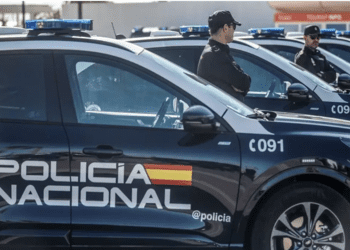A high-ranking Spanish police officer's suspected involvement in cocaine smuggling may harm a drug trafficking trial and shows how corruption penetrates all levels of the country’s security forces.
Juan Carlos Carrión López, who led the police operation that seized 3.8 tons of cocaine from a ship in Vigo, Spain in 2020, was meant to be a crucial witness in the ongoing trial of 28 people accused of drug trafficking.
However, Carrión's credibility and the strength of the prosecution have been questioned after he was arrested in March in connection with facilitating cocaine trafficking from Colombia to Spain. At the time of his arrest, he was serving as a police liaison at the Spanish Embassy in Colombia.
He has not yet appeared in court due to reported health issues.
Flood of Cocaine Spreads Beyond Europe’s Cities, Wastewater Shows
A defense lawyer representing the 28 accused of trafficking said, “[Carrión] is accused of more crimes than the defendants in this case.” noted Carrión is alleged to be the head of a criminal network within the Spanish police that moved cocaine shipments from Colombia to Spain, collaborating with drug trafficking clans in Murcia, southeastern Spain.
The group used a middleman to work with drug trafficking clans in Murcia, and then Carrión and his accomplices supposedly organized police operations to intercept the drugs in transit, despite having been paid for the shipments. recordings This information was obtained by Spanish police and accessed by the newspaper El Confidencial.
In recordings, Carrión is heard telling a collaborator, “If you follow my orders, no one will be in trouble. But if we each go our own way, we’ll be in a world of problems. You might even go to prison.” This exchange occurred after a 150-kilogram cocaine shipment was held up because a criminal group failed to pay Carrión in advance.
In February, the head of the Spanish police’s drugs and crime unit in Murcia was arrested for allegedly protecting middlemen who negotiated with drug trafficking groups.
Both police commanders had received awards for their work in fighting drug trafficking during their careers.
Despite the charges and other notable cases of police corruption in Spain, authorities continue to deny that there is a widespread problem.
“This is a one-off case that can happen once in five years, or may not arise at all,” said Ángel Bodoque Agredano, a Spanish drug prosecutor, to InSight Crime. corruption InSight Crime Analysis
Corruption is a significant factor in the cocaine supply chain to Europe, and Juan Carlos Carrión's case is an extreme example of this issue.
In Europe, 71% of the most threatening criminal networks use some form of corruption, and 28% use it proactively and systematically, according to a recent report.
by the European Union Agency for Law Enforcement Cooperation (Europol).
Furthermore, corruption from drug trafficking infiltrates both private and public institutions, and police corruption is one of the most beneficial forms of corruption for criminal groups. report On April 12, a Spanish court
sentenced a member of Spain’s municipal police and two national police officers to more than seven years in prison for protecting a shipment of 367 kilograms of Colombian cocaine in 2022. The shipment was stopped thanks to international cooperation between Spanish and Colombian prosecutors.
Back in 2022, Spanish authorities sentenced arrested five municipal police officers at the port of Algeciras, as well as a policeman stationed in Ceuta, a customs official, and a former police official for their suspected involvement in a drug ring that smuggled 6.2 tons of cocaine through southern Spain in various shipments.
Spanish Mega Lab Raises Questions About Cocaine Production in Europe
This type of corruption can weaken the credibility of institutions and harm their relationships with international partners in the fight against drug trafficking. Detecting, investigating, and prosecuting this form of corruption is crucial for disrupting transnational drug trafficking operations. arrested “Incidents like [the case of Carrión] can only help us increase international cooperation and try to achieve the best levels of trust in Latin America,” prosecutor Bodoque Agredano told InSight Crime.
Despite these efforts, the growing cocaine trade continues to entice public and private sector workers into corruption.
“Criminal organizations are becoming increasingly powerful, and the profit and criminal money that is flowing is enormous. We all know that. Anyone can be tempted to join this dynamic,” said Bodoque Agredano.
Featured image: Police agents conduct an anti-narcotics operation in Spain. Credit: Rober Solsona / Europa Press
The purported involvement of a high-ranking Spanish police officer in cocaine smuggling threatens to undermine a drug trafficking trial and highlights how corruption permeates all levels of the country’s security forces.
The agent, Juan Carlos Carrión López, was expected to be a key witness in an ongoing trial of 28 people accused of trafficking 3.8 tons of cocaine to Spain. The drugs were seized in 2020 from a ship docked in Vigo, on the country’s northwest coast. Carrión led the police operation that seized the drugs.

